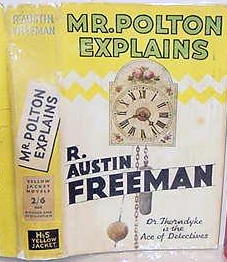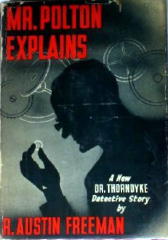Sat 31 Mar 2007
Review by Mary Reed: R. AUSTIN FREEMAN – Mr. Polton Explains
Posted by Steve under Authors , Reviews[2] Comments
“R(ichard) Austin Freeman (April 11, 1862 – September 28, 1943) was a British writer of detective stories, mostly featuring the medico-legal forensic investigator Dr Thorndyke. He invented the inverted detective story, in which the identity of the criminal is shown from the beginning: some of these were collected in The Singing Bone in 1912.
“[Using] some of his early experiences as a colonial surgeon in his novels … a large proportion of the Dr Thorndyke stories involve genuine, but often quite arcane, points of scientific knowledge, from areas such as tropical medicine, metallurgy and toxicology.”
R. AUSTIN FREEMAN – Mr Polton Explains
Hodder & Stoughton, UK, 1940. Dodd Mead, US, 1940. Popular Library #70, pb, 1946.
We’ve probably all played “what if,” going further and further back in our lives to establish the chain of circumstances which led to playing the very game itself, and in this case to your reading this review.

Mr Polton Speaks, written in two parts, begins in this fashion. Nathaniel Polton, orphaned as a toddler, relates the various stages of his somewhat Dickensian life up to his making Dr Thorndyke’s acquaintance, the circumstances of which explain his devotion to the good doctor. He also tells how he learnt certain skills, some of which will be very useful to his employer when he becomes servant/assistant to Dr Thorndyke.
Much detail is given about Mr Polton’s interest in a particular profession and a specific invention of his which, years later, provides a vital clue to unraveling a mysterious death, the circumstances of which form the second part of the book, narrated by Dr Jervis. To my surprise Mr Polton actually states which particular knowledge contributed to the solution of the crime, though this revelation was not really needed because between autobiographical comments and the description of the scene of the crime it is obvious how the murder was accomplished, if not the person responsible.
In brief, a fire completely guts a house where Mr Haire has taken rooms. Fortunately for him, he was in Ireland at the time, but unfortunately his cousin, Cecil Moxdale, was staying in the flat. The building is completely burnt out and the body is found more or less charred out of recognition although items found in the debris establish its identity.
And yet … certain aspects of the death suggest it was not accidental or even suicide and so Thorndyke and Jervis become involved. Although the resolution hinges on a whacking great coincidence which stretches the long arm of coincidence so much it’s amazing it didn’t fall off, on rereading Mr Polton’s section I found circumstances described there (in a more subtle manner than the statement mentioned above) do in fact provide a fair clue or two to the alert reader.

My verdict: Alas, this is the most disappointing of this author’s works read so far. In fact, it gives the distinct impression Mr Polton’s autobiography was grafted onto a short story to form a novel. The necessary information could, I believe, have been provided within the section penned by Dr Jervis easily enough and in a far less obvious manner. Shocking to relate, I found Mr Polton’s life story more interesting than the mystery and its resolution, though the latter did have an unexpected twist.
E-text link: http://gutenberg.net.au/ebooks05/0500371.txt
October 28th, 2015 at 9:35 pm
You know what they say of horseraces? I thought this a brilliant example of Freeman ‘ s gifts.
June 23rd, 2019 at 4:26 pm
Mary,
I read your review on gadetectives, as well as here. I wondered if you had been able to pinpoint the age Mr. Polton was and what year that would have been. I have a theory that he could have been one of Sherlock Holmes’ Baker Street Irregulars, but it only holds together if Polton was a child in the late 1800s. Your response is greatly appreciated!